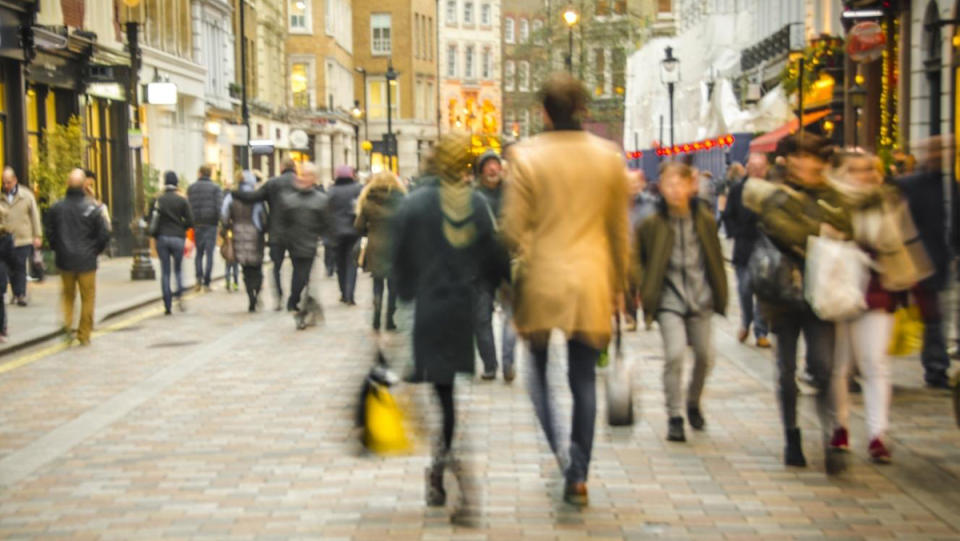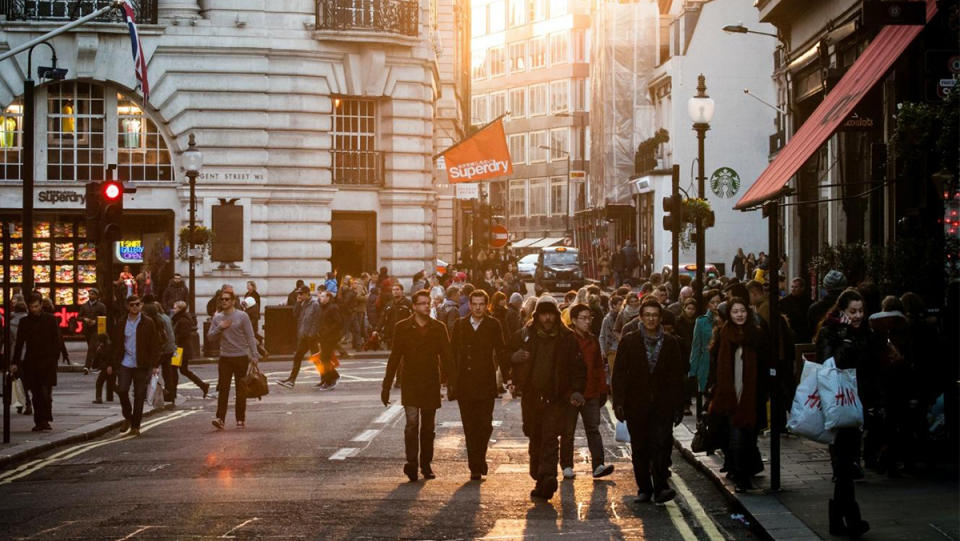How the U.K’s Tax-Free Shopping Ban Has Upended London’s Luxury Industry

- Oops!Something went wrong.Please try again later.
- Oops!Something went wrong.Please try again later.
It’s a brochure that’s been discreetly circulating in the recent fashion weeks: Three buildings on London’s toniest retail strip, Bond Street, are available for the right tenant. Though current occupant Hugo Boss hasn’t formally announced its exit, five-year leases on the spaces are available “immediately,” the ad trills. The German luxury brand isn’t alone in seeking to shutter its stores in London. This Golden Mile of luxury retail has other potholes: The 130-year-old department store Fenwicks closed earlier this year, earmarked for condos, and Mulberry’s boutique is also no more.
Footfall is down, one Bond St. loyalist told Robb Report: “I went into YSL and my favorite sales associate told me she was leaving. But she’s not going to another boutique. She’s leaving retail because she can’t make money on commissions anymore. Most days now, she sees a couple of walk-ins at most.”
More from Robb Report
India's Luxe Menswear Brands Are Making Some of the World's Most Covetable Threads
The IRS Is Going After Thousands of Millionaires Who Haven't Filed Their Taxes in Years
Economic headwinds are certainly strong in the U.K. Britain just dipped into recession, and the economy remains 5 percent smaller than pre-Brexit, per Goldman Sachs. But the reasons for the blight on Bond Street are more specific: On January 1, 2021, the U.K. government imposed legislation that hiked prices on goods for visitors by 20 percent. That is to say, it abolished the policy that permitted non-residents to reclaim sales tax on their purchases when leaving the U.K. (Northern Ireland is an exception.)
In Europe, visitors can carve that back sale tax, via the assistance of third-party companies like Global Blue or Premier TaxFree. But such a policy gave tourists a $2.54 billion free ride each year on the back of the British taxpayer, trumpeted a then-chancellor Rishi Sunak. Why should they benefit at locals’ expense?

It was a popular, populist gesture that caused few ripples among the public at the time. Now, three years later, that decision has had long-time, wide-ranging impacts on the economy, directly and indirectly—so much so that strong rumors suggest Jeremy Hunt, the current chancellor, will reinstate the freebie system next week, during his spring financial statement on March 6.
Paul Barnes certainly hopes Hunt will have a change of heart. He runs AIR, the Association for International Retail, an organization set up in 2020, just before the decision to nix this loophole. It campaigns to increase the spend of international visitors to the U.K. and specifically to revoke this policy. The amount spent by Americans in the U.K. in 2022, Barnes says, was back to 101 percent of its 2019 levels pre-pandemic, per AIR’s data. Good news, until you compare that with France, where the same group’s spending had more than doubled over the same period, to 226 percent. It’s not a question of currency, either, as both the Euro and British pound remain weak against the greenback. The simple answer is that tax hike, Barnes believes.
“The worry is that visitors are only just starting to realize they can’t shop tax-free, so as more and more Americans start to understand that, the gap between spending in Britain and in mainland Europe will get worse,” said Barnes, noting that brands have been quick to respond. “If you’re an international brand, do you put money into London or into Paris? You’ll put it where the rich people shop.”
He points to a hotel on Park Lane where wealthy guests booked an entire floor for several weeks, only to shut it up for two days to go to Paris; they’d saved their shopping for that 48-hour jaunt. Elsewhere in London, staffers at a menswear boutique worked for several hours with a client who’d picked around $75,000 of clothes to buy. But when the shopper learned that he wouldn’t be able to reclaim thousands of dollars in tax for the first time, “he put them all back,” said Barnes. “He told them to get in touch with their Paris store so he could buy them there. The Brits had done all the hard work.”
The driver for the policy was a collision between Brexit and World Trade Organization rules. The latter requires the U.K. to treat all visitors equally, while the former made the 448 million people who live in the EU newly entitled to the tax-free shopping benefit. Rather than expand the scheme, then-chancellor Sunak reasoned it was safer to abolish it altogether. It’s a decision that baffles hotelier and ardent Brexiteer, Sir Rocco Forte.
Forte has been one of the loudest voices campaigning against the tax-free changes and has seen the impact for himself via his network of five-star properties that straddle the U.K. and EU.
“Britain is shooting itself in the foot, as it makes us uncompetitive with continental Europe. My hotels in this country are underperforming those in Italy,” he told Robb Report. “And when I talk to American travel agents, they tell me some of their clients take this into consideration when they’re deciding where to go.”
Amy Siegal is one of them.

“The U.K. is not a shopping destination for my clients,” said the luxury adviser with Valerie Wilson Travel in New York. “It doesn’t have the same tax-free appeal that it once did. My shopping clients will just add another stop if they want to take advantage of some shopping deals.”
It’s ironic that Rishi Sunak, himself a multi-millionaire who lived and worked stateside for some time, is behind a policy that seems so unfamiliar with the mindset of the global super-rich—who think nothing of adding that quick 48-hour detour to Paris to sate their shopping itch.
“The U.K. is a tiny country, so going to Paris to do some shopping feels like a massive journey, but for people from the U.S. who’d go to the next state to see their cousin for brunch, it’s not,” said Helen Brockleback, who runs Walpole, a consortium which promotes British luxury in all sectors. She emphasizes that there’s a hidden cost to this policy, too. Walpole studied high-end tourism across the region in 2019, working with management consultancy, Bain. It found that the U.K. had the largest high-end visitor spend of any country—at roughly $32.54 billion, it was 21 percent of the $10.85 billion total (ahead of Paris and Milan).
“That matters because for every pound someone spends in high-end accommodation, for example, eight more pounds are spent in the local community, on hairdressers, taxis, or in restaurants,” she said, noting that she has yet to conduct similar research since the tax-free rules were changed.
Brocklebank’s research shows another unintended consequence of the tax hike. While international labels simply see spending shift from one center to another, homegrown businesses—like Lancashire-based luxury bed linen firm Peter Reed, a supplier to the royal family—are left in the soup.
“Sales in London have been so impacted that now, when staff have retired in the manufacturing facility, they haven’t replaced them,” Brocklebank said of Peter Reed. “It’s a small, brilliant British business that is committed to employing three people in the U.K. that they can’t.”

No wonder, then, jet-setting shoppers showed excitement at the rumors that the policy may be rescinded, after the government asked an independent organization to review the numbers behind the policy anew. Sadly, those hopes look to be dashed: A leaked government memo saw one minister say, outright, it was “not possible to introduce the same system as before.” It takes for granted that spending has continued, despite data from the likes of AIR and Walpole.
“A new VAT-free shopping scheme could subsidize a large amount of tourist spending that already occurs without a tax relief in place, without bringing any direct benefits to the British public,” the memo said.
For the foreseeable future, then, American shopaholics should skip Bond Street and head straight for the Champs-Elysées.
Best of Robb Report
The Ultimate Miami Spa Guide: 15 Luxurious Places to Treat Yourself
The 7 Most Insanely Luxurious Spas in the World, From Tokyo to Iceland
17 Reasons the Caribbean Should Be at the Top of Your Travel Itinerary
Sign up for Robb Report's Newsletter. For the latest news, follow us on Facebook, Twitter, and Instagram.

